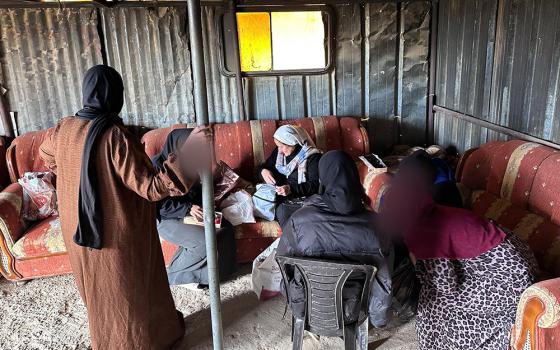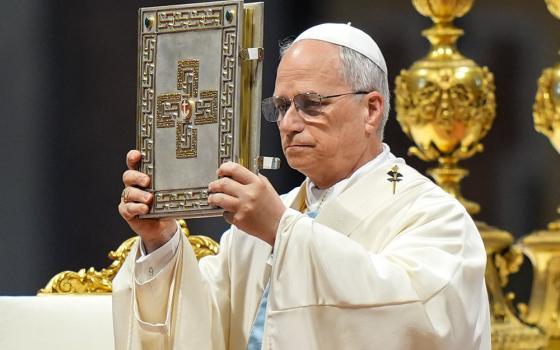
(Unsplash / Jerry Wang)
I have the most beautiful Christmas cactus in my office. It filled up with blooms just in time for Thanksgiving, sporting about 30 gorgeous pink flowers by the time I turned out the lights for the four-day weekend. Admittedly, I was a teensy bit worried that when I returned after the holiday, those blooms might not have fared too well over the extended weekend, but I was fairly certain the damage wouldn't be too bad.
Wrong.
I am looking right now at a cactus that has one pathetic-looking wilty flower left on it and only a few maybe-they'll-make-it buds forming on the ends of the other leaves. The carnage from the once-beautiful blossoms was found scattered all over my table and carpet when I returned from the Thanksgiving break, and I am not happy.
I realize this is the cycle of life and death, that beauty is temporary and that it must be enjoyed while it lasts rather than being disparaged for its brevity. I know enough horticulture to recognize that this cycle is to be expected. But that didn't arrest my disappointment nor stifle my cry when I saw those gorgeous, underappreciated petals on the floor.
Loss. Change. Diminishment. Death. 'Tis the season for all these things. I begrudgingly acknowledge every November that death visits more frequently in the winter months. The exuberance with which I soak in all the autumn colors is usually matched proportionately with the malaise that sets in with the gray, cold days that make up early December. And right about now, when darkness takes up more hours of the day than daylight? Well, I'm pretty sure I'm not the only one who counts the days until it starts to get lighter again.
Advertisement
We aren't made for endings. We aren't made for darkness. And we certainly aren't made for death. We have been created for love, for life and for eternity. So when temporality reminds us that we can't have the fullness of any of it yet, something in our human nature rebels with either a sob or a whimper.
The wail that comes from a mother who has lost her child is no comparison for the whine I expressed at the sight of my cactus. Yet both responses indicate something important about who we are: They show that we recognize the things in our life that have value, the things that are precious, the things that ought be treasured. And when those are taken from us, we mourn the loss. We mourn the loss of presence, the loss of anticipated future, the loss of what we hoped could be. These are no small losses.
I have wept this week with grieving loved ones. I have whined this week about failing body parts. Everywhere I go, it seems there is something to grieve. Our country appears torn in two over politics; our Earth is suffering by fire and flood and pollution; our children are frightened and anxious in staggering numbers; our minds are worried about past, present or future — or possibly all three simultaneously. Everything from naval bases to romaine lettuce seems to be a potential threat somehow. I sometimes worry that wishing a stranger "Merry Christmas!" might be offensive, and I notice that I have slowly become more cautious and a bit more protective in my thinking, my speaking and my engaging.
In the midst of it all, Advent begins. The church year teaches us to start anew. With each Advent Sunday, more candlelight enters the darkened chapel. With each December daybreak, we are one day closer to the celebration of the entry into our world of the tiny Christ-life that would change things forever — for eternity. The Christ-life that would turn death to life, darkness to light, and tears to laughter. The Christ-life that would break every chain and loose every bond. The Christ-life that came to set all people free — free from bondage, free from death, free from evil and sin.
The Word was made into our very flesh, and dwelt among and within us. And from that moment on, all flesh, all humanity, all temporality, all things imperfect and uncertain have ceased to be random. Jesus' birth gave meaning to all life — and to all death. It may not be the kind of meaning that we can grasp in the moment, or even on this side of eternity, but it is the kind of meaning that is real. It is trustworthy even as much as it is elusive.
That is the reality we long for, this is our plea when we sing: "O come, O come, Emmanuel — and ransom captive Israel, that mourns in lonely exile here until the Son of God appear." We, Israel, are captive by time, captive by death, captive by suffering that receives only silence in response to the choked question of "Why?" We mourn in this exile from eternity, from perfect relationship. Come, O come! You, who have promised to be "God-with-us," come and ransom us from this captivity, this exile!
When the last notes are ended and the music has faded into the blackness of the dark, one pinpoint of light appears out of the silent night. And it is done. He is born. He is come. The light shines in the darkness and the darkness will never overcome it. In that moment, let us sing together in full voice: "Rejoice! Rejoice! Emmanuel has come to thee, O Israel!"
We await you, O Lord. Come and set us free.
[Virginia Herbers is an Apostle of the Sacred Heart of Jesus who is director of spiritual formation at St. Louis University. She has a master's degree in pastoral studies and has ministered in education at both the elementary and high school levels in Connecticut, New York, Missouri and Taiwan.]







